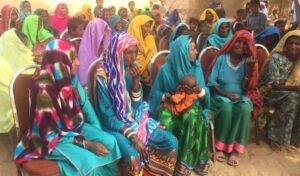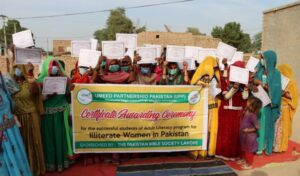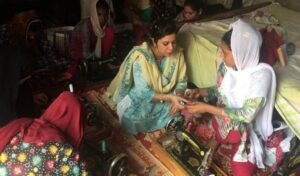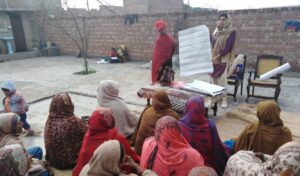How do poor Hindu and Christian women belonging to lower-ranked caste groups prevent local disputes turning into inter-religious violent conflict that perpetually plague Pakistani Punjab, like the fires and violence in Jaranwala?
After all, these are women who supposedly lack agency as they experience several intersecting levels of marginalisation in a highly hierarchical society. In the Punjab province in Pakistan hierarchies are based on gender, class, caste, and religious hierarchies. Hindu and Christian women live in a highly conservative patriarchal society, are poor, live in urban slums or settlements outside villages called ghareebabad (poor people’s abode), belong to lower-ranked biradaris (caste-like kinship groups), and are religious minorities. Yet, despite the layers of marginalisation they suffer, some of them manage to mobilise change by developing a series of strategies together to solve local disputes.

Collectively working under Peace Committees
How do they do it? Together, they act quickly, use diplomacy, and work in collaboration with key actors. Collectively under Peace Committees, they try to solve issues as early as possible, fixing misunderstandings to avoid flaring up through religious tension. They use diplomacy and tactical manoeuvring, persuading parents, family members, and neighbours through repeated interactions, gently resolving misunderstandings, and empathically showing ‘the other.’
The women constantly work in collaboration with an array of like-minded influential local actors, from informal public authorities and intermediaries such as panchayat members, political brokers, religious leaders, landlords, to formal ones, such as NGOs and local public officials. Under the hat of peace committees, these women bring potential dispute cases to the attention of informal public authorities. They bring these influential local actors along when they meet the dispute parties, and even help formal actors’ investigations of larger disputes.
These were the main findings of our analysis of 30-odd focus group discussions and more than 100 key informant interviews conducted in 2020 by Umeed Partnership Pakistan (UPP) field staff in four districts of Punjab with women beneficiaries of their capacity building programmes. In participatory research funded by the Coalition for Religious Equality and Inclusive Development programme (CREID), the focus group discussions and interviews centred on how women beneficiaries experienced discrimination and the role they played in local dispute resolution through local peace committees.
Christian, Hindu and Muslim women forming alliances
Their secret ingredient? They rope in equally marginalised Muslim women. In fact, the first crucial step Christian and Hindu poor women of lower-ranked biradaris do is to form alliances with other similar marginalised groups, namely Muslim poor women of lower-ranked castes living in the same urban slums and rural ghareebabads. Even in the most recent attack, Muslim neighbours tried to protect their Christian ones: “Some Christians found refuge with their Muslim neighbours (…) Muslims had quickly pinned Quranic verses on the doors of Christian homes in the hope they would be spared.”
Despite coming from different religious backgrounds, geography, class, caste, and gender binds them and allows them to build bridges across their religious differences. Instead of focusing on differences (particularly in religious differences) they focus on similarities (being poor, being women, being of lower rank within local social structures) to work together as peace committee members. Collectively they work as mediators solving local issues, preventing them from turning into disputes, or preventing disputes from turning into inter-religious violent conflict.

Skills training
These Peace Committees are UPP’s brainchild. UPP is a Pakistani local NGO whose work focuses on empowering women and street-children through education, skills training, and rights and legal aid awareness programmes. Peace committees are the last stage of their capacity building programmes.
At a first stage, when they start working in a new settlement, UPP enrols about 25 poor and marginalised women into a nine-month adult literacy programme. Upon completion, UPP selects around 20 women to complete a 12-month skills training (usually sewing and embroidery). UPP subcontracts local teachers and tailors as trainers for these two levels of capacity building. Some of these women become factory workers, self-employed, and at times even pool in resources and become business partners irrespective of caste, religion, or ethnicity.

During the 12-month skills training, UPP field supervisors – with the help of the teachers and tailors – identify women who are more confident and outspoken and encourage them to participate in a three-month training on peace committees. With the aim of forming interfaith local groups that can meet and resolve local disputes, UPP trains about 10 women on basic knowledge of rights, family laws, conflict resolution, and interfaith dialogue.
Although there aren’t set selection criteria, UPP pays particular attention to women who show leadership potential: confident, open-minded, empathic, compassionate, and related to men with some status within their localities. When assessing leadership qualities, the UPP team observes how the potential peace committee members engage outside their groups particularly with other faith groups.

Still, this is not entirely a rosy picture. Many women in these peace committees face a lot of resistance from local male elites, even within their minority groups who see these women encroaching in what they perceive to be their ‘natural’ territory, that of local dispute resolution. Also, if a dispute escalates beyond a misunderstanding these women are powerless (and therefore the need for swiftness in their actions).
At the end of the day though, women peace committees do exhibit some successes in preventing inter-faith conflict, where the expectation is low – both for the chance of conflict being prevented and for the role that women can play to prevent it. It shows how women of different faiths can come together for a common goal and play a role to help build peace.

